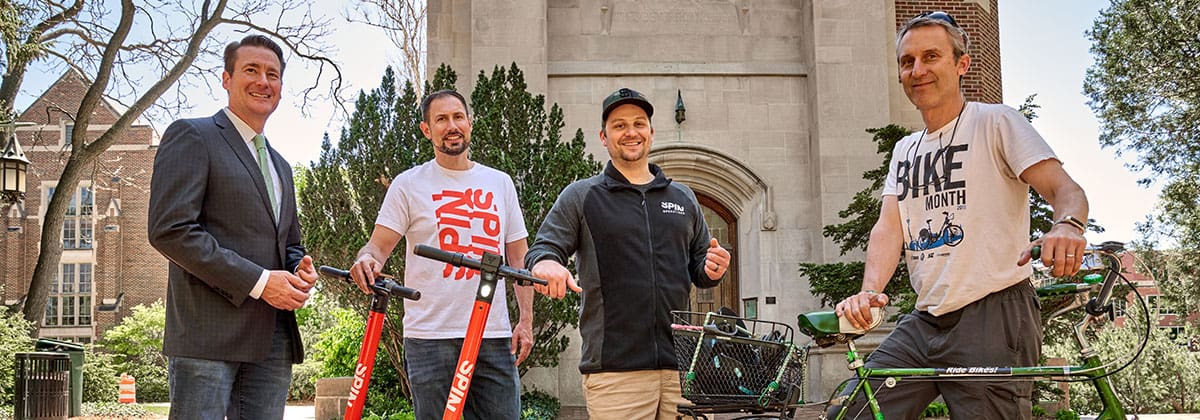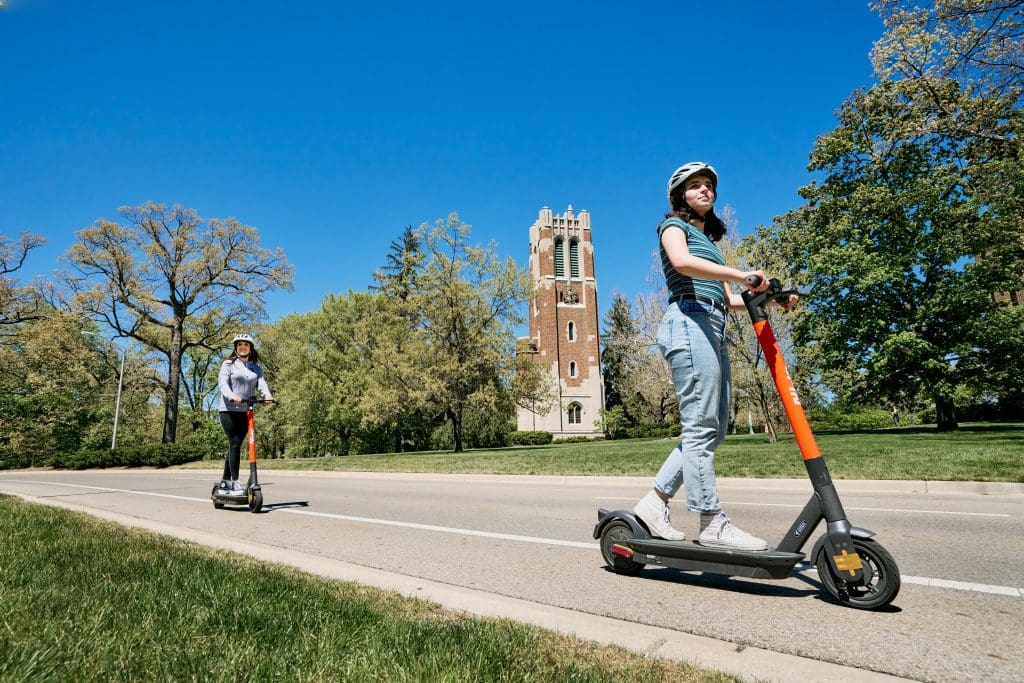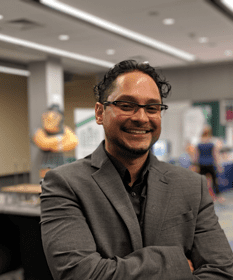
Data from the National Travel Survey suggests that 28% of all trips annually in the US were less than a mile, and 60% used private vehicles. With such a large portion of US travel happening over such short distances, there is a significant opportunity to reduce emissions by shifting some of these trips from private vehicles reliant on fossil fuels to other more sustainable transportation methods.
Micromobility on Campus
The Michigan State University campus covers more than 8 square miles. For decades, students, visitors, and faculty alike have relied on bicycles as one way to navigate through MSU’s sprawling campus. Recently, however, there has been a significant increase in the micromobility options available to those on campus. Micromobility typically refers to user-driven vehicles, including personal bicycles, bike shares, electric skateboards, e-bikes, and now electric scooters, which have become ubiquitous on campus and in cities across the US.
In 2021, as students began to return to campus amid the COVID-19 pandemic, an agreement was signed with SPIN Scooters, a San Francisco-based micromobility company. As part of their agreement with MSU, SPIN has agreed to share anonymized data from the scooters to help researchers at MSU better understand how and when users are utilizing e-scooters on campus.
Other Stories: New Partnership Brings E-Scooters Back to Campus
SPIN: Vendor and Partner
Despite the popularity of e-scooters, the current research on e-scooter use is limited in scope, with most research only focusing on summary statistics. Michigan State, with its high population density, high ridership volume due to strong student adoption of e-scooter use, and nearly 60 miles of roads, 120 miles of pedestrian walkways, and nearly 20 miles of bike lanes, make Michigan State’s campus an excellent research ecosystem.

SPIN is more than a vendor, however, but also a research collaborator working with MSU faculty to study multiple facets of the micromobility ecosystem on MSU’s campus. “We’re thrilled for the opportunity to continue our multiple partnerships with faculty, staff, and students at Michigan State,” commented John Lankford, Head of Campus Partnerships at SPIN. “The campus footprint offers a perfect use case for shared mobility, with the research partnership providing the opportunity to further explore and improve enhanced outcomes related to micromobility.”
Other Stories: Spin E-Scooters Generate Heavy Use in 2021
Micromobility Research at MSU
Starting in the Fall of 2021 and now expanding in the Fall of 2022, SPIN and MSU will partner to provide more in-depth research into e-scooter usage. Utilizing a portion of the revenues generated from on-campus e-scooter use, MSU and SPIN are funding two studies by faculty members Dr. T. Teresa Qu and Dr. Rabindra Ratan to explore the Mode Shift and Social Perceptions of e-scooters amongst the MSU student population.
Understanding How SPIN Impacts Micromobility
Dr. Tongbin “Teresa” Qu, professor at MSU’s Department of Community Sustainability, is slated to begin research on how the

introduction of e-scooters on campus shift travel behaviors among MSU students. “I am very excited to work on the SPIN research project. The project will not only examine SPIN e-scooter users’ mobility patterns but also research e-scooters as a sustainable and climate-conscious transportation tool for mobility needs, specifically the potentials in reducing driving and as the first/last mile connections to transit.” Says Qu.
The research will combine self-reported data from SPIN rides with a cross-sectional survey combined with SPIN GPS trip data to analyze shifts in user behaviors. Qu adds, “The project also provided an opportunity for interdisciplinary student research. I am going to work with four bright and energetic undergraduate students from three departments across MSU’s campus: Rose Murphy and Sarah Calvert from the Department of Community Sustainability, Joey Allen from the School of Planning, Design, and Construction, and Jiayue Chai from the Department of Computer Science. I cannot wait to get the project started.”
Read More: Mobility Faculty Feature – Dr. Tongbin “Teresa’ Qu
Using Social Cues to Improve Micromobility User Interactions
Electric scooters can be an excellent option for micromobility trips. However, the way users operate e-scooters can sometimes be

potentially unsafe or disruptive. “Our research aims to simultaneously address issues of e-scooter vandalism and parking safety on campus while also developing new understandings of the ways that people interact with mobile computing technology more generally. We are excited for this project to impact both on campus and in the academic literature.” Says Dr. Rabindra “Robby” Ratan, Professor of Media & Information at MSU.
The research hopes to uncover how messaging and social cues within the e-scooter mobile application can influence rider safety and parking behaviors. In addition, Ratan hopes the research results will benefit both MSU and SPIN by identifying key design features that can decrease the cost of e-scooter maintenance and repair, increase rider frequency, curb unsafe ridership, and reduce errant parking or vandalism.
Read More: Mobility Faculty Feature – Dr. Rabindra Ratan
Campus and Living Lab
MSU’s 5,200-acre campus is the ideal testbed to study all areas of mobility advancement. Its 8.1 square miles of urban, suburban, industrial, and rural areas offer a unique environment to advance mobility research.

“I am pleased that the vision of the MSU – SPIN partnership is coming to fruition and that the MSU revenue share can fund two interesting research collaborations this year.” Says Brice Nelson, Director of Corporate Partnerships at MSU Business Connect, “It is a great demonstration of the campus-as-a-living lab concept where the research results will lead to innovation on MSU’s campus.”
To learn more about the MSU/SPIN partnership or how your company can utilize MSU’s campus for developing and testing advanced safety and mobility management systems, contact Brice Nelson or click the button below.
